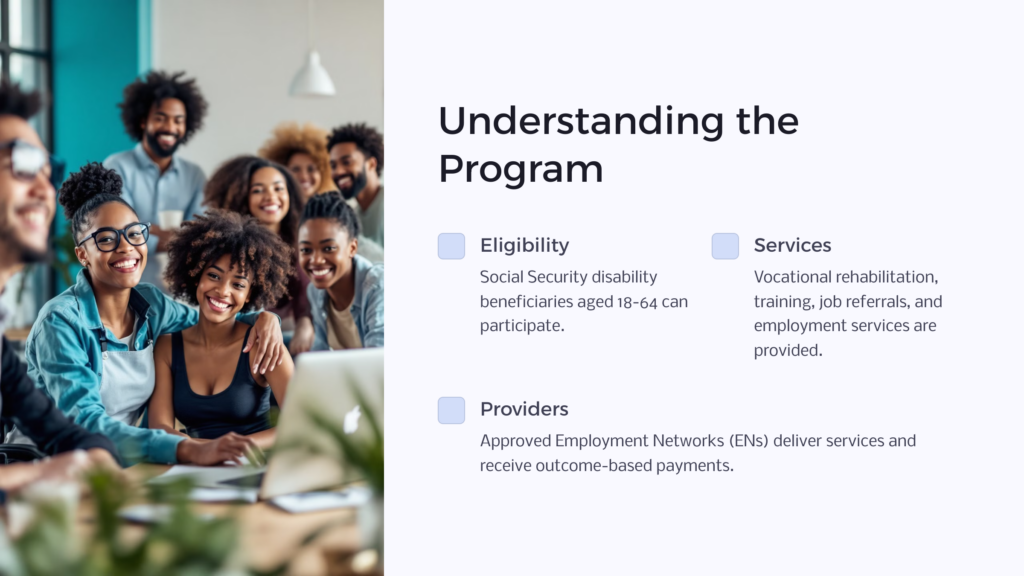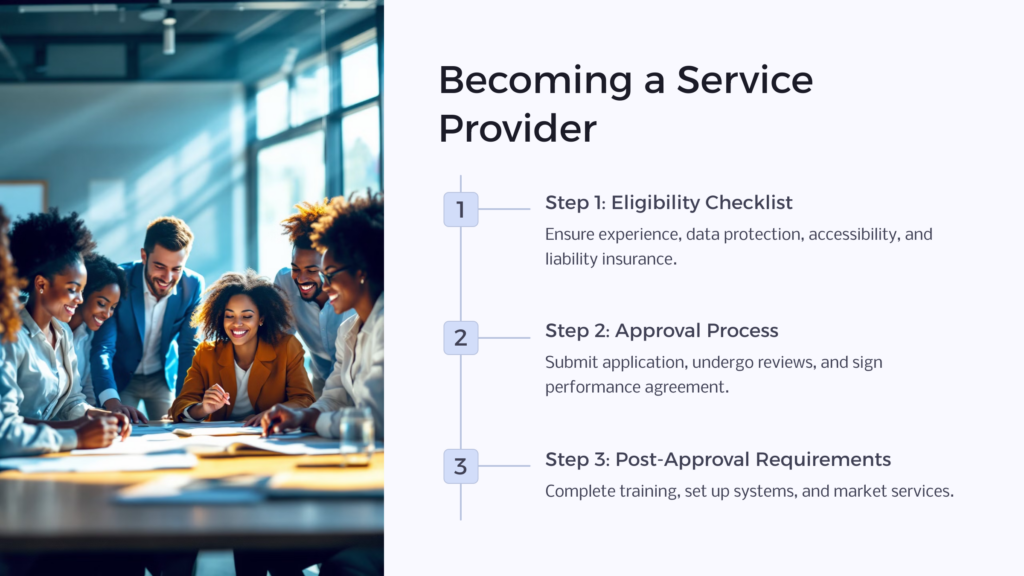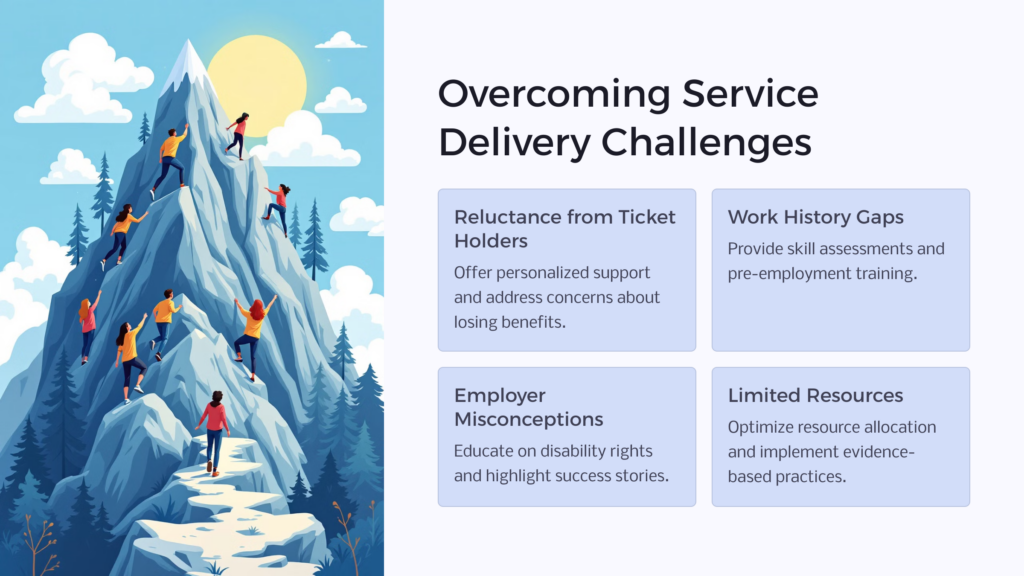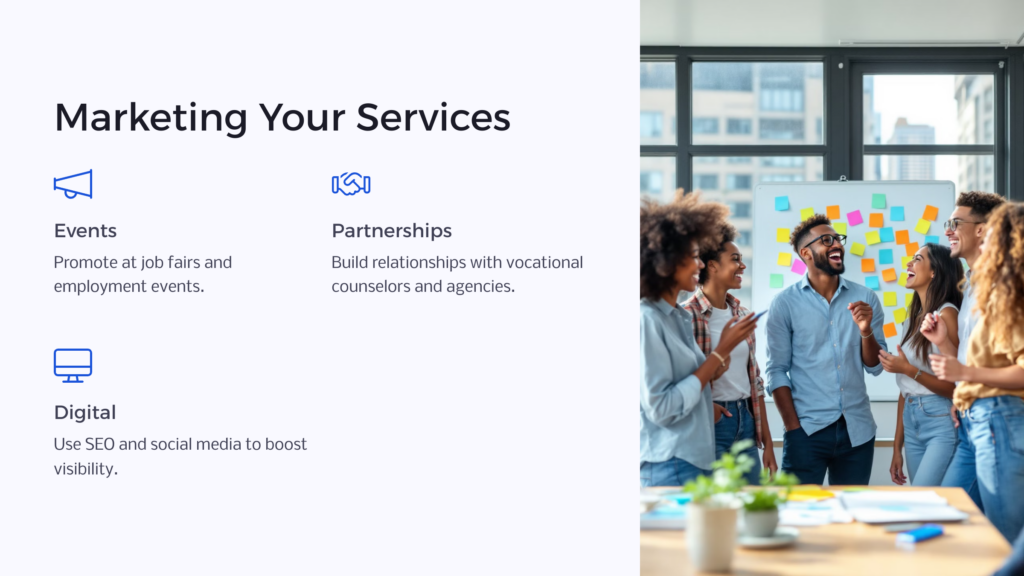The Ticket to Work Program is an employment program administered by the Social Security Administration (SSA) that aims to help Social Security disability beneficiaries return to work. When service providers participate in this program, they expand their clientele while helping disabled individuals secure employment and financial independence.
Understanding the Ticket to Work Program

The Ticket to Work Program allows any qualified Social Security disability beneficiary aged 18-64 to obtain vocational rehabilitation, training, job referrals, and other employment services from approved service providers called Employment Networks (ENs). These ENs, including single providers or provider networks, help ticket holders find and retain employment in return for outcome-based payments from SSA’s Ticket Payment System.
To become an Employment Network, the service provider must apply and be approved under one of two systems – as an individual provider network that serves ticket holders directly or as part of an existing EN. Individual EN applicants undergo financial assurance reviews, sign performance agreements, and complete required training.
Major advantages for approved ENs are guaranteed referrals of prescreened, motivated clients and milestone-based payments for achievements like job placements and retention. This performance-based system incentivizes ENs to provide high-quality, outcome-focused services to help clients maximize their work potential.
SSI and Ticket to Work
The Ticket to Work Program is closely related to the Supplemental Security Income (SSI) program, as both are administered by the Social Security Administration and aim to help individuals with disabilities achieve financial independence through disability resources and employment opportunities provided by approved service providers. Service providers participating in the Ticket to Work Program can also assist SSI beneficiaries in securing job placements and retaining employment through outcome-based payments and support services.
Steps to Become a Service Provider

Becoming an individual or member Employment Network involves meeting eligibility criteria, getting approved, and completing requirements – here is a step-by-step overview:
Step 1: Eligibility Checklist
To qualify as an EN, you must:
- Have experience and capability to provide employment services
- Have systems to hold and protect data
- Be accessible to individuals with disabilities
- Have liability insurance
Step 2: Approval Process
- Submit an application including details on capabilities, quality assurance, past performance, financial systems, and liability coverage
- Go through financial assurance reviews and interviews to demonstrate readiness
- Sign the EN performance agreement to officially become an EN
Step 3: Post-Approval Requirements
Once approved, ENs must complete further requirements:
- Attend a training session
- Set up systems to handle program financial administration, reporting, appeals, and more
- Market services to ticket holders in the area
Carefully evaluating roles within an organization and establishing strong systems for service delivery, data reporting, ongoing quality assurance, and appeal handling are vital to being a successful EN.
Providing Services under the Ticket Program
ENs can provide a range of disability services and employment services to ticket holders including vocational counseling, benefits planning, career guidance, skills assessment, pre-employment training, job matching and placement assistance.
When serving ticket holders, it is essential for ENs to maintain program compliance by:
- Ensuring services align with what was approved in applications
- Using SSA reporting systems accurately and in a timely manner
- Monitoring service quality and uphold employee qualifications
- Meeting payment system requirements in order to receive payments
Recommended best practices for service delivery include:
- Conducting comprehensive assessments to set work readiness goals
- Creating Individual Work Plans to map clients’ goals, needs and services
- Leveraging partnerships with American Job Centers to supplement services
- Providing work incentives planning to ease concerns over losing benefits
- Using evidence-based interventions tailored to the individual needs of each disability recipient
- Measuring progress frequently and adjusting approaches as needed
- Celebrating small wins to build confidence

Common challenges in service delivery include:
Reluctance from ticket holders: Employment Networks can address reluctance from potential clients by offering personalized support, directly focusing on client concerns about losing their disability benefit, and emphasizing the positive impact employment has on financial independence and overall well-being. By tailoring services to each client, ENs can help individuals overcome barriers to participation in the Ticket to Work Program.
Work History Gaps: ENs can assist their job seeker in addressing gaps in work history through skill assessments, pre-employment training, and job placement support. By providing personalized guidance, ENs can help each individual overcome barriers and build confidence in re-entering the workforce successfully. Also, working closely with American Job Centers can provide more services for addressing gaps in work history effectively.
Employers’ Misconceptions About Disabilities: Misconceptions include assumptions that individuals with disabilities are less productive or reliable, which can lead to discrimination in the hiring process. EN service providers can help combat these misconceptions by educating employers on disability rights and discrimination, providing resources for disability benefits and creating inclusive work environments, and highlighting stories of disabled individuals who are qualified for jobs. Create an environment of understanding and inclusivity to help bridge the gap between employers and qualified candidates from the Ticket to Work Program.
Difficulty Prioritizing Services with Limited Resources: It’s crucial to adjust strategies to ensure effective use of your disability resources continually. Focus on efficient resource allocation, streamline processes based on impact, and implement evidence-based practices to maximize outcomes within constraints.
To address these and other challenges, ENs should focus on building trust with ticket holders, offering tailored support, educating employers on disability accommodations, and optimizing resource allocation for maximum impact. By proactively addressing these issues, service providers can effectively navigate obstacles in service delivery under the Ticket to Work Program.
Navigating the Payment System
SSA administers an outcome-payment system to incentivize ENs – as clients hit milestones, ENs receive compensation:
- Ticket Assignment Payments: Payments for assigning ticket holders to an EN
- Outcome Payments: Larger payments are issued as clients hit job placement and retention milestones
To receive payments, ENs must register assigned ticket holders through SSA reporting systems. As ENs help ticket holders achieve work goals, they intermittently submit payment requests to get compensated based on those outcomes.
Tips for tracking and reporting data include:
- Compiling detailed documentation on service delivery and achievements
- Maintaining accurate records in reporting systems
- Developing internal processes to request and reconcile payments
- Setting reminders for key payment request deadlines
- Verifying payment details on Monthly Payment Statements
With sound reporting protocols, ENs can take advantage of the work incentive-based model to increase their earning potential.
Marketing Your Services

Effective marketing helps ENs educate prospective ticket holders on available services and employment opportunities. Some good marketing tactics include:
- Promoting services at disability job fairs and employment events
- Presenting at local Social Security offices about the Ticket Program
- Building relationships with vocational counselors and staff at disability service agencies to facilitate referrals
- Using search engine optimization strategies to boost web visibility
- Leveraging social media platforms to share career resources and inspirational client success stories
- Highlighting key differentiators like work incentive expertise
Digital marketing helps ENs expand their reach in a budget-friendly manner while strategic partnerships enable tapping into key referral networks.
FAQs
What qualifications do we need to apply as an EN?
EN applicants must show that they can deliver suitable employment services and meet financial assurance criteria. Individual providers require a year of operating experience in employment services with disability expertise.
Do we need specialized staff to serve ticket holders?
Not necessarily. Your staff must demonstrate core competencies, but specific disability certifications are not required currently. You can access SSA training and resources to build disability employment knowledge.
How many ticket holders do we need to serve?
There are no minimum service requirements currently. The number served depends on your staff’s capabilities and service area size. Smaller ENs can successfully operate by strategically partnering with American Job Centers.
What reporting is required for payments?
ENs must submit monthly reports on services delivered, outcomes achieved based on approved milestones, changes in ticket assignment status, and more. Accurate reporting is required to receive payments.
How much can an EN earn from the payments?
Aggregate payments vary based on milestones achieved across your client roster. Small ENs with limited staff may earn anywhere from $15,000-$65,000+ annually while larger networks may earn over $1 million.
Can an individual provider join an existing EN?
Yes, individual providers can apply to join larger, established ENs as member providers instead of managing the entire compliance system alone. This enables leveraging shared resources.
What types of services can an EN provide?
ENs can deliver a mix of employment support services spanning across benefits counseling, assessment, skills training, career guidance, job placement help, workplace accommodations coordination, and long-term retention support.
 Benefits.com Advisors
Benefits.com Advisors
With expertise spanning local, state, and federal benefit programs, our team is dedicated to guiding individuals towards the perfect program tailored to their unique circumstances.
Rise to the top with Peak Benefits!
Join our Peak Benefits Newsletter for the latest news, resources, and offers on all things government benefits.




















